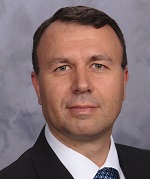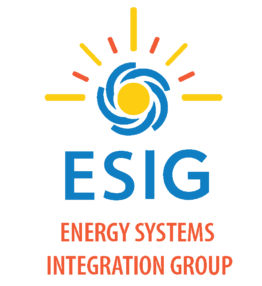
- This event has passed.
G-PST/ESIG Webinar Series: Weak Grid Connection of IBR, Why Are We Still Talking About This?
November 10, 2021 @ 4:00 pm - 5:00 pm EST

Weak Grid Connection of IBR, Why Are We Still Talking About This?
Wednesday, November 10 – 4:00 – 5:00 p.m. (eastern US)
Featured Speaker: Sebastian Achilles, Managing Director Power Systems Operation and Planning, GE Energy Consulting
 Webinar Abstract: Operation of Inverter Based Resources (IBR) in weak grid conditions is a relatively old subject that does not seem to go away. The webinar will begin with a short introduction on the types of performance issues associated with weak grid and related mitigations used in the industry. We will then elaborate on how the weak grid operation challenges have changed in recent years due to the large deployment of IBR, and aspects of grid code requirements that affect the risk of weak grid related issues in the lifetime of IBR plants. The speaker will also share observations on study, modeling and short circuit ratio (SCR) screening aspects based on recent experiences, with a focus on what seems to be changing from prior practices. The discussion will elaborate on grid following (GFL) and grid forming (GFM) IBR resources in the context of weak grids, and why GFM may help, but not necessarily solve, all weak grid risks. The talk will be presented from an OEM perspective.
Webinar Abstract: Operation of Inverter Based Resources (IBR) in weak grid conditions is a relatively old subject that does not seem to go away. The webinar will begin with a short introduction on the types of performance issues associated with weak grid and related mitigations used in the industry. We will then elaborate on how the weak grid operation challenges have changed in recent years due to the large deployment of IBR, and aspects of grid code requirements that affect the risk of weak grid related issues in the lifetime of IBR plants. The speaker will also share observations on study, modeling and short circuit ratio (SCR) screening aspects based on recent experiences, with a focus on what seems to be changing from prior practices. The discussion will elaborate on grid following (GFL) and grid forming (GFM) IBR resources in the context of weak grids, and why GFM may help, but not necessarily solve, all weak grid risks. The talk will be presented from an OEM perspective.
Moderator: Charlie Smith, Executive Director, ESIG
Registration Cost: FREE
Q&A Session: We will be using the slido platform for Q&A. Please submit your questions and follow-along during the event at this link.
About the Speaker: Sebastian Achilles is Managing Director, Power Systems Operation and Planning at GE Energy Consulting. His responsibilities include integration and interconnection of onshore wind, offshore wind, PV solar, battery and FACTS technologies globally. His team provides support to product design related to grid behavior of these IBRs. Team also provides consulting support to developers and transmission entities related to same area of expertise.
About G-PST Consortium
The chief executive officers of National Grid Electricity System Operator UK, California Independent System Operator (CAISO), Australia Energy Market Operator (AEMO), Ireland’s System Operator (EirGrid), and Denmark’s System Operator (Energinet) are champions in developing the consortium mission and activities. Importantly, these system operators are leading a Research Agenda Group to identify common, cutting-edge research questions that can inform large- scale national research and development investments. Relevant results and lessons from this process will be broadly shared for learning across all countries. The Consortium is also partnering with around 10 emerging economy and developing country system operators from Africa, Asia, Latin America and Eastern Europe who will also guide the G-PST vision and collaborate with the Consortium to advance power system transformation with a focus on technical collaboration, peer learning and exchange, and workforce development to support local PST priorities.
A core team, including the Energy Systems Integration Group (ESIG), Imperial College London, Council of Scientific and Industrial Research (CSIR), Fraunhofer Cluster of Excellence for Integrated Energy Systems, National Renewable Energy Laboratory, Latin American Energy Organization (OLADE), IEEE, Electric Power Research Institute (EPRI), Commonwealth Scientific and Industrial Research Organization (CSIRO), the Danish Technical University (DTU), and ASEAN Center for Energy, is actively developing the consortium and will be engaged in implementation of technical work as well as coordinating specific pillars.
International agencies and multilateral and regional development banks, including World Bank, United States Agency for International Development (USAID), German Agency for International Cooperation (GIZ), International Energy Agency (IEA), Asian Development Bank (ADB), European Bank for Reconstruction and Development (EBRD) and others are serving as key implementing partners to ensure the consortium complements and reinforces existing programs.
For more information on the G-PST visit https://globalpst.org/.

